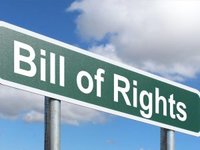’Tis the Season for Celebrating Freedom
In this First Five column from the Freedom Forum Institute, NewseumED encourages people to celebrate Bill of Rights Day on Dec. 15 by breaking the cycle of ignorance and misinformation that threatens our fundamental freedoms.
By Katharine Kosin and Pierce McManus

Have you noticed there’s a special “day” for just about everything? Pick any date on the calendar and odds are it’s been designated National or International (fill-in-the-blank) Day.
Do you love tacos? You’re in luck because Oct. 4 is National Taco Day. Are felines more your fancy? Commemorate your furry friends on Oct. 29, National Cat Day. Think Cat Day is funny? Spread the joy of laughter on International Joke Day, which happens to fall on July 1. You get the idea.
As much as we love tacos, cats and a good rib-tickler, we can express these heartfelt desires — and much more serious opinions — because of freedoms protected by the First Amendment.
So on Dec. 15, we’ll be celebrating Bill of Rights Day, a day first observed 78 years ago to commemorate ratification of the first 10 amendments to the U.S. Constitution in 1791. The First Amendment, our favorite, guarantees the freedom of religion, speech, press, assembly and petition. It protects the core rights that shape our American experience.
The liberties in the First Amendment are crucial for our democratic government to function. They allow us to express ourselves, no matter how displeasing our ideas may be to the government or society at large. They ensure access to the information we need to make decisions in our daily lives, whether we’re at the supermarket or in the voting booth, and they assure the accountability of those in power by protecting freedom of the press. And while these fundamental rights are powerful and enjoy their own special day, they should not be taken for granted.
For one thing, local, state and federal governments don’t always respect the boundaries established by the Bill of Rights. The federal government temporarily limited the freedoms of speech and press with the Sedition Act in 1798 and state governments used to bar women and African Americans of any sex from serving on juries, interfering with the due process rights of female and black defendants guaranteed by the Sixth Amendment. In more recent times, the courts have better served as a check on government interference in these freedoms, but we still must remain vigilant.
When it comes to the First Amendment, government interference is not the only threat. There is a troubling lack of awareness among the public about what rights it protects and why they are vital for our democracy. This year’s State of the First Amendment survey, conducted by the Freedom Forum Institute, found that 29 percent of U.S. adults cannot name a single freedom covered by the First Amendment. Even more concerning, 29 percent think the First Amendment goes too far, up six percentage points from the previous year.
Even when these rights are both recognized and respected, they can bring their own complications and challenges. For example, freedom of speech and press give us access to information, but also create opportunities for disinformation to spread, which uproots our understanding of reality and blurs our judgment of whom or what to trust. This undermines faith in elections and other democratic institutions and sparks unnecessary friction in our society.
First Amendment freedoms are directly impacted by this information disorder. Online trolls and hoaxes have tricked people into showing up and exercising their freedom of petition and assembly for no apparent reason, such as when dozens showed up at Pennsylvania’s Gettysburg National Battlefield in July 2017 in response to a fake story claiming Confederate graves were about to be desecrated there. Freedom of speech, which is one of the cornerstones of our democracy, is not as effective or helpful when the opinions expressed are based on false or inaccurate information. And appreciation for freedom of the press can be undermined when completely made-up stories are confused for real news, muddying the media landscape.
So this Dec. 15, do your part to break the cycle of ignorance and misinformation that threatens our fundamental freedoms. Brush up on your constitutional freedoms and learn more about misinformation. Democracy demands it and our future depends on it.
As a starting point, you can learn how to identify and deflect misinformation that serves as propaganda at our new microsite, Disinformation-Nation.org. You can find other resources to hone your media literacy skills on NewseumED.org/medialiteracy and with the Newstrition app.
From all of us to all of you, Happy Bill of Rights Day!
Kosin is a NewseumED museum educator and McManus is NewseumED’s digital communications and outreach director.